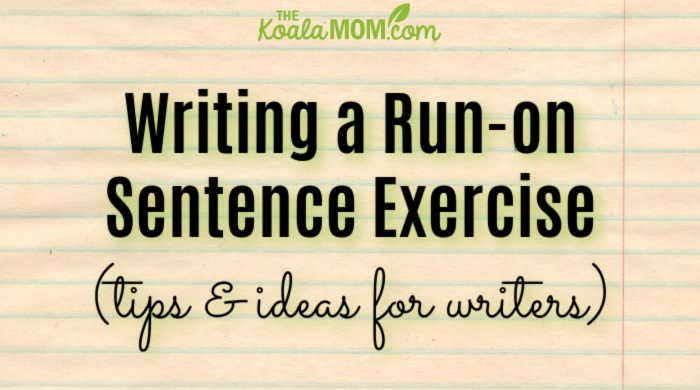On Monday in one of my writing classes, our instructor gave us an exercise: write a run-on sentence. As long as you can. No rules; just write. Then we had to write a seven word sentence, a six word sentence, a five word sentence, and so on until we finished with a one-word sentence. When we’d finished that exercise, we turned it around and started with a one-word sentence, finishing with a run-on sentence.
It was an interesting exercise to contrast the difference between writing with no restrictions and writing with tight restrictions (or rules). Both were, in their own way, challenging. I’m an editor; writing a run-on sentence was hard. There were so many places where I just wanted to put in a period and start another sentence, but I was supposed to keep going. Yet that was when the writing flowed easily. When I had to write the shorter sentences, and count each word in the sentence, my writing began to sound silly, chopped, forced.

Here’s what I came up with in class:
My favourite music is country music, but it wasn’t always and I should clarify that I don’t like any and all country music — I like country music because so many country songs tell a story, like the old joke goes: “Play a country song backwards and you’ll get back your wife, your kids, your job, your house” — that’s stories, although I like the positive stories better, the ones with a “feel-good” note or a lasting value, the ones that make you think for a while or just hit you “right there” and make you ache or cry or want to write such a story yourself. My brother gave me this music appreciation. He played country radio all day. I learned the tunes, chords. The music behind the words. It sang within. I felt. Learned.
It was interesting to me to play with the differences in writing, when there were rules or no rules. There was a time when I wrote for fun, just to play with the words and tell the stories. Now, before I even start writing, I’m aware of word count, whether or not I can use first or third person, grammar and spelling and so many other considerations.
These are, of course, part of a writer’s life; as an editor, I understand the necessity of articles of a certain length and type. As a writer, I just want to write. Thus I strive for balance between the two and in it all, to keep that joy of just playing with words and sentences.
Practice Your Craft (Write Regularly)
If you’re also a writer trying to perfect your craft, I recommend trying different writing exercises like this to stretch your writing skills. Play around with what works and how it sounds and maybe the form will fit a bigger piece you’re writing. It’s also interesting to take note of how other authors use techniques like these; for example, some older authors like Henry James and Charles Dickens were great at writing run-on sentences.
If you’re looking for more ideas to expand your craft, check out these resources (some of these links are affiliate links; as an Amazon associate, I earn from qualifying purchases):
- Things Feigned or Imagined by Fred Stenson
- Story Engineering: Mastering the 6 Core Competencies of Successful Writing by Brooks
- A Passion for Narrative by Jack Hodgins
- The Maeve Binchy Writer’s Club by Maeve Binchy
- The Art of the Personal Essay edited by Phillip Lopat
- Contemporary Creative Nonfiction: I & Eye
- The Joy of Writing: A Guide for Writers, Disguised as a Literary Memoir by Pierre Berton

2 Comments
Jim – apparently the last 187 pages of Finnegan’s Wake by James Joyce are all one sentence. But that’s James Joyce… Herman Melville liked long sentences too. I would say long sentences are fine with proper punctuation to make it clear for the reader. As you say, the odd one is fine – variety is the spice of life and varying sentence length helps make your writing more interesting. 🙂
I once wrote a story in a single sentence 1125 words long. Got is published too. I used to write much longer sentences than I do now but although they show how clever you can be too many of them can make the reader’s life hard and why work against yourself like that? The odd one’s fine.